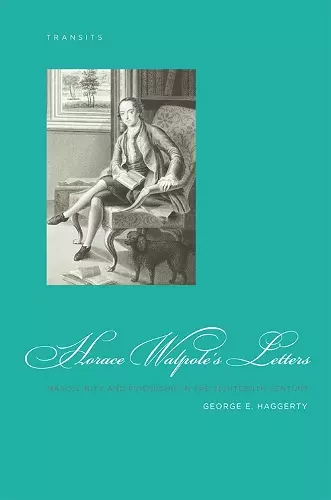Horace Walpole's Letters
Masculinity and Friendship in the Eighteenth Century
Format:Hardback
Publisher:Associated University Presses
Published:12th May '11
Currently unavailable, and unfortunately no date known when it will be back

In looking closely at Horace Walpole's Correspondence, George E. Haggerty shows how these letters, when taken in aggregate, offer an astonishingly vivid account of the vagaries of eighteenth-century masculinity. Walpole talks about himself obsessively: his wants, his needs, his desires; his physical and mental pain; his artistic appreciation and his critical responses. It is impossible to read these letters and not come away with a vivid impression of a complex personality from another age. Haggerty examines the ways in which Walpole presents himself as an eighteenth-century gentleman, and considers his personal relationships, his needs and aspirations, his emotionalism and his rationality—in short, his construction of himself—in order to see what it tells us about the age in general and more specifically, about masculinity in an era of social flux.
This study of Walpole and his epistolary relations offers a unique window into both the history of masculinity in the eighteenth century and the codification of friendship as the preeminent value in western culture. Recent studies have tried to rewrite Walpole in a twenty-first century mold while this work looks at the writer and the ways in which he constructs himself and his relations, not in hopes of uncovering a lurid secret, but rather in pursuit of the figure that he created and that has fascinated generations of readers and writers since the eighteenth century.
Haggerty (Univ. of California, Riverside) seeks to show that Walpole's letters (which run to 48 volumes in the Yale edition, 1937-83) constitute "one of the great literary accomplishments of the [18th] century, at least on a par with Boswell's Life of Johnson and Gibbon's Decline and Fall," and in the process to explore that era's constructions of masculinity. The first effort does not succeed (this is a critic for whom Walpole's wooden play The Mysterious Mother is a "literary masterpiece"); the second bears more fruit, though little here is new. Much of this brief book comprises quotations from the letters, followed by paraphrase or summary, even when their import is quite clear. Haggerty's commentary can be banal ("I think we can all be pleased that this great correspondence ends on a high note"; "his life is a performance in which he is the major player"; Eton was an "already famous school" when Walpole attended). Haggerty writes clearly, and it is pleasant to revisit Walpole's thoughts on friendship and collecting, but this is a curiously empty book that only specialists will find themselves consulting. * Choice Reviews *
ISBN: 9781611480108
Dimensions: 241mm x 163mm x 15mm
Weight: 386g
186 pages